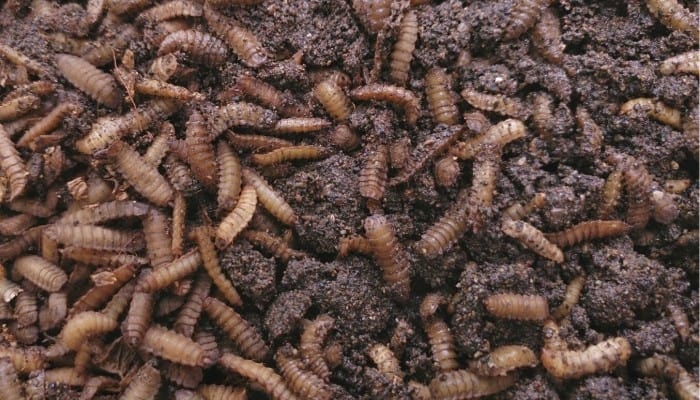Do you notice maggots in your compost bin? Most likely, it’s not the sight you’re hoping for when you first open the lid in the morning.
Though they’re undeniably disgusting, the good news is that it’s easy to get rid of maggots once they’ve invaded your compost – and to prevent them from ever returning.
Why are there maggots in my compost? Maggots found in compost are usually black soldier fly larvae. They are result of adult black soldier flies being attracted to the decomposing matter and laying eggs within the compost. These larvae are completely harmless and help accelerate decomposition. Control is possible but not necessary.
Maggots in the compost are not harmful. However, read on if you don’t want to deal with these gross-looking pests in your bin.
Most Common Maggot Found in Compost: Black Soldier Fly
There are several types of maggots that might manifest in your compost pile. The most common ones are black soldier fly larvae, or Hermetia illucens.
Black Soldier Fly Larvae Identification
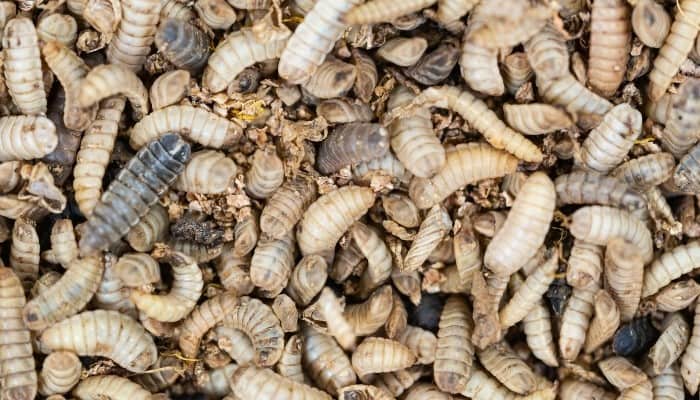
It is relatively easy to identify black soldier fly larvae because they tend to be fatter than other kinds of maggots.
They can be gray, brown, or white, with the color varying depending on what they most recently ate.
The adult flies are annoying enough when they’re buzzing around your face – but when they lay eggs in your compost pile? Beyond irritating.
However, it’s important to note that these species serve as special sources of food for lizards, fish, and birds.
In fact, many pet stores even sell black soldier fly larvae to feed to pets like chickens.
Adult flies are about ¾” long and are typically a shiny black color. They look more like wasps than typical house flies.
The Role Black Soldier Fly Larvae Play
Black soldier fly females lay their eggs on the surface of exposed nitrogen-rich material.
While that might sound unsanitary and unpleasant to deal with, the reality is that black soldier flies actually play a critical role.
Maggots help break down organic matter in the compost pile, enabling it to decompose more easily.
Also, the flies inoculate the pile with helpful bacteria from other sources that they carry in on their bodies.
This can improve the fertility of your compost when you go to use it in your garden.
What Attracts Black Soldier Flies?
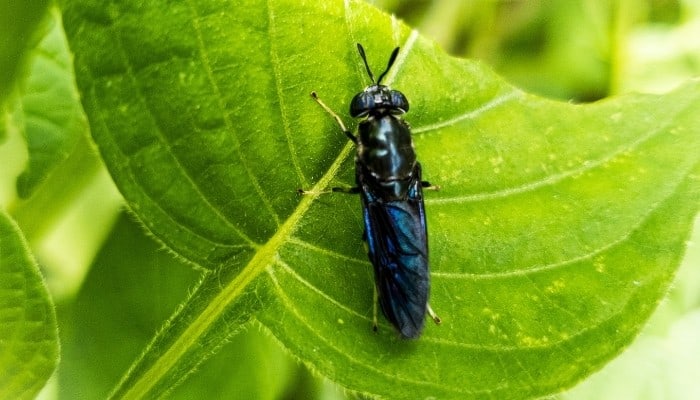
As you might expect, black soldier flies are attracted to your compost for the free source of food.
From animal manure to kitchen waste, your compost bin is loaded with all kinds of tasty treats for these flies.
They also appreciate the warm, moist environment offered by a compost bin.
So why aren’t they found in each and every compost pile on the block?
The simple answer to that is that black soldier flies typically appear when there is an imbalance of green and brown ingredients in your pile – namely if you don’t have enough “browns” or carbons in your pile.
An excess of food waste and manure might cause such an imbalance.
Not turning your compost pile regularly or letting it get too moist can cause the pile to be oversaturated.
This excessive moisture provides welcomed wet spots for black soldier flies to congregate and lay their eggs too.
Do Black Soldiers Bite or Sting?
Black soldier flies (as well as their larvae) do not have functional mouthparts. Because of this, they can’t bite. They also do not have stinging mechanisms.
So while black soldier flies and black soldier fly larvae might be pests you don’t want to deal with around your compost pile, you don’t have to worry about them harming you in any way.
How To Prevent Maggots in Compost
The easiest way to get rid of maggots in a compost pile is to prevent them from showing up in the first place. Fortunately, this is relatively easy to do.
1. Make Sure You Have a Balanced Pile
You’ll prevent most kinds of compost pests, like maggots and other insects and mammals, by keeping your compost pile balanced.
Don’t overload it with too many nitrogen-rich ingredients like manure and food waste.
Instead, make sure you add things like dry grass, leaves, shredded paper, and other brown matter to thoroughly cover all the nitrogen sources by at least two inches.
If you add food scraps, bury them deeply.
2. Avoid Piling on Grass Clippings in Huge Amounts
It’s a great idea to dispose of lawn waste like grass clippings in your compost pile. However, don’t add it all at once.
Thick layers of fresh-cut grass are going to prove to be extremely attractive to flies!
Instead, spread out the clippings and let them dry before you add them (a little at a time) to your compost pile.
3. Install Window Screen
If you have an enclosed compost system (like a tumbler), you can use a window screen to cover up any holes in your bin. You can glue it down with some exterior household caulk.
This will prevent the flies from getting inside the bin to lay eggs while still allowing air inside for ventilation.
4. Don’t Compost Meat, Dairy, or Fat
While composting food waste like coffee grounds, fruit and vegetable scraps, and even garden waste is a great way to build a pile, you should avoid composting things like meat, fat, or dairy products.
Although these things do eventually break down, they do so very slowly. In the meantime, they’ll attract flies who will lay their eggs in the pile.
5. Consider a Sealed Compost Bin
Open compost bins pose many benefits – namely, you won’t need to provide water to the pile as often, nor will you have to worry about airflow.
However, most of the time, a closed compost bin is going to be much more effective at protecting against maggot infestations.
Just remember to continue to turn the pile often so that excess heat and moisture don’t build up.
How To Get Rid of Maggots in Compost
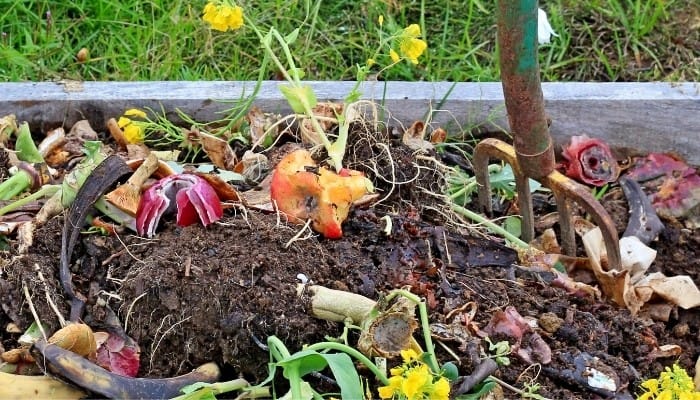
Even when you take the best steps toward preventing maggots in your compost pile, they can still sneak in on you. Here are some tips to help you get rid of them.
1. Add More Brown Ingredients
Maggots thrive on nitrogen-rich matter, so adding brown (carbon-rich) ingredients can help you get rid of the maggots. They simply won’t have enough food to sustain themselves!
Consider adding things like cardboard, leaves, or wood chips to your pile.
2. Try Lime
You need to be careful adding lime to your compost pile since it can elevate the pH to unhealthy levels.
However, lime is an effective way to get rid of maggots to help the pile break down faster and reduce the amount of food the larvae have to feed on.
Add about one cup of lime for every 25 cubic feet of compost. Alternatively, you can add amendments such as pine needles or citrus fruit.
3. Add Vinegar
Another remedy that countless gardeners swear by is adding vinegar to the compost.
Again, this increases the acidity and can make the compost pile an unfavorable environment for flies. Just a tablespoon for every 20 pounds of compost is all you need.
4. Feed Them to the Birds
One last thing for getting rid of maggots in compost – don’t just throw them out once you find them in your compost pile. Instead, put them to good use and feed them to the birds.
If you have chickens, they’ll love snacking on black soldier fly larvae. Wild birds will appreciate the treat too, so let them go to town when you find a few.
5. Hang Fly Traps Nearby
When maggots in the compost continue to be a problem, consider hanging a few fly strips and traps nearby.
These will draw flies to them, trap them, and then prevent them from laying their eggs. These traps can be especially helpful during warm, wet weather.
6. Leave Them Alone
If the mere presence of the maggots in your compost doesn’t gross you out, consider leaving them where they are.
Maggots aren’t harmful – and they’ll actually help break down waste more quickly. It might not make for the most appealing compost, but it can make it more effective.
Other Maggots Found in Compost
There are other kinds of flies that lay eggs in compost besides black soldier flies. Here is a quick overview to help you address the maggots regardless of the parent species.
Moth Flies
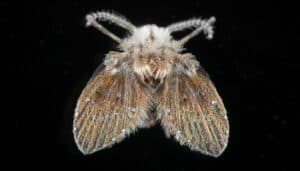
Moth flies (also known as drain flies or psychodid flies), are small flies with rounded wings. They look similar to moths but are actually flies, hence the name.
- Identification: Both their square bodies and wings are hairy, and they also have large antennae that make them look like moths too.
- Attracted to: Organic material and moist soil.
- Solution: Moderate moisture in the compost pile, set out fly traps.
Dark-Winged Fungus Gnats
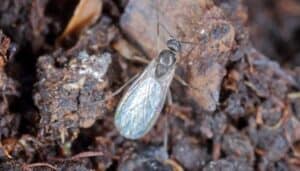
Fungus gnats are most common on houseplants and in greenhouses, but they can also occur in compost.
- Identification: Fungus gnats, or sciarid flies, are gray-black with transparent wings. They have long legs and hop from place to place (though they can also fly).
- Attracted to: Moisture and fungus, both present in soil and compost.
- Solution: Moderate moisture levels, provide aeration or apply straw, and set fly traps on the pile’s surface.
Fruit Flies
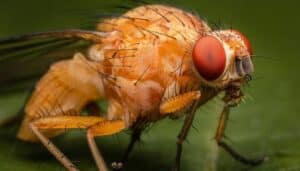
Especially if you have a lot of food waste in your compost pile, fruit flies may stop by.
- Identification: These flies breed rapidly and are pale brown in color with red eyes. They’re about ⅛” long.
- Attracted to: Decomposing fruits and vegetables.
- Solution: Add only small amounts of scraps at once or apply a bit of diatomaceous earth to the pile.
Are Maggots in Compost Good or Bad?
So should you leave the maggots in your compost? Should you evict them as quickly as possible? There are pros and cons to both sides of the story.
Here are the pros and cons of maggots in the compost.
Pros:
- Help break down the compost faster.
- Provide food to birds like chickens.
- Introduce helpful bacteria to the compost pile.
Cons:
- Some people say the larvae deplete the compost pile of nutrients.
- Unpleasant to work with.
Are Maggots Bad for the Garden?
Maggots are found just about everywhere in nature, from rotting vegetation to the roots of garden plants – and even in compost.
Are maggots bad for the garden? Not necessarily.
They will actually help break down a compost pile quicker, meaning you’ll have plenty of “black gold” to use around your plants much sooner than you expected.
However, the presence of maggots can indicate that something is not quite right in your compost pile, whether that’s moisture levels or pH.
Because of this, you should view their presence as a warning, and do your best to fix the situation.
What Are the Tiny White Worms in Compost?
Maggots can be white, but if you notice even tinier white worms wiggling around in your compost – that you know are definitely not maggots – you might be dealing with pot worms.
Pot worms are tiny organisms that eat waste and aerate the compost pile. They aren’t dangerous in any way, nor do they threaten the health of your compost pile.
The exception to this is if you are vermicomposting with red wiggler worms.
Pot worms thrive on conditions that aren’t suitable for red wigglers, so if you notice pot worms, the health of your red wigglers might be in jeopardy.
These worms are most common when the pH balance in a compost has been adjusted or if the pile is much wetter than normal.
These tiny thread-like worms multiply quickly but can be removed by regular compost turning and adjusting the pH balance of the compost.
Will Vinegar Kill Maggots?
Vinegar not only kills the live maggots in a compost pile but also renders the environment less suitable for flies to breed in.
It also helps to eliminate odors that attract flies, preventing them (even if only temporarily) from laying eggs.
The best way to use vinegar in your compost is to combine one part vinegar with three parts boiling water, then dump it on the pile.
What Is the Lifespan of Maggots?
The good news about maggots is that they don’t remain maggots very long.
On average, a maggot will only stay in that stage for around 30 days.
The bad news is that when a maggot develops into a fly, it’s still going to have an appetite for rotting and decomposing material – so the life cycle in your compost pile may perpetuate itself.
Conclusion
Most of the time, it’s totally fine to have a few maggots in your compost.
However, if it grosses you out or you find that your pile is being too rapidly depleted of nutrients, it might be time to evict them.
Consider the given tips to identify, prevent, and remove maggots from your compost for good!

